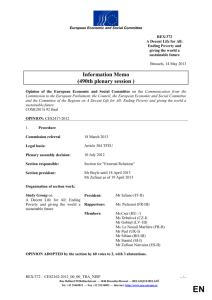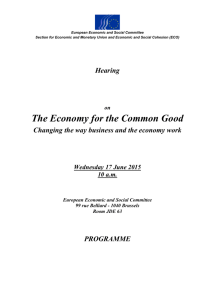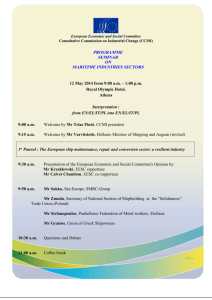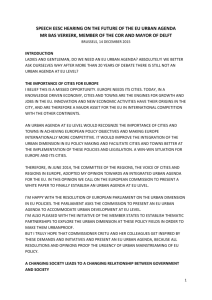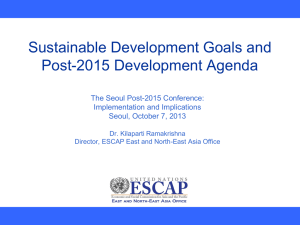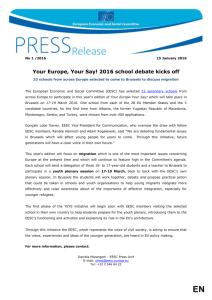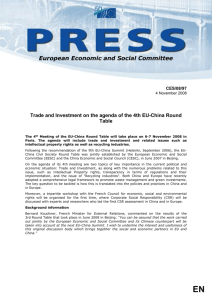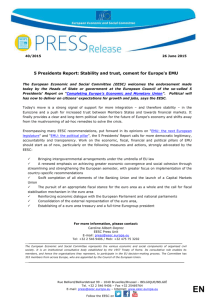A Decent Life for All - EESC European Economic and Social
advertisement
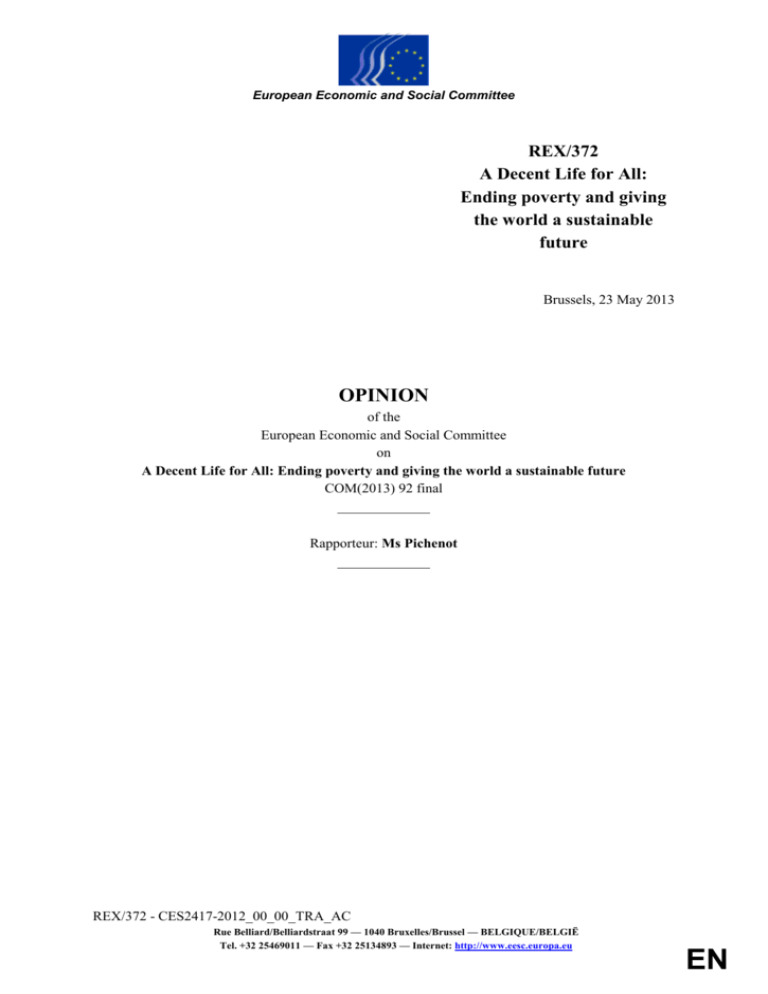
European Economic and Social Committee REX/372 A Decent Life for All: Ending poverty and giving the world a sustainable future Brussels, 23 May 2013 OPINION of the European Economic and Social Committee on A Decent Life for All: Ending poverty and giving the world a sustainable future COM(2013) 92 final _____________ Rapporteur: Ms Pichenot _____________ REX/372 - CES2417-2012_00_00_TRA_AC Rue Belliard/Belliardstraat 99 — 1040 Bruxelles/Brussel — BELGIQUE/BELGIË Tel. +32 25469011 — Fax +32 25134893 — Internet: http://www.eesc.europa.eu EN -1- On 18 March 2013 the European Commission decided to consult the European Economic and Social Committee, under Article 304 of the Treaty on the Functioning of the European Union, on A Decent Life for All: Ending poverty and giving the world a sustainable future COM(2013) 92 final. The Section for External Relations, which was responsible for preparing the Committee's work on the subject, adopted its opinion on 25 April 2013. At its 490th plenary session, held on 22 and 23 May 2013 (meeting of 23 May 2013), the European Economic and Social Committee adopted the following opinion by 103 votes with 6 abstentions. * * * 1. Conclusions and recommendations 1.1 Achieving MDG/SDG convergence 1.1.1 For the first time in its history humanity has the knowledge, the economic resources and the technical means to eradicate poverty at global level by 2030. This is an immense source of hope for more than one billion human beings who are still the victims of extreme poverty. For the first time too, states will be accountable, in the period up to 2050, for together better managing the planet's natural capital as a limited resource, to be protected and shared with future generations. 1.1.2 The focal point of the September 2013 UN negotiations is to decide upon a universal definition of the Sustainable Development Goals (SDG) with a view to reconciling, over the long term, the fight against poverty, sustainable production and consumption, and preserving natural resources. To integrate the review of the Millennium Development Goals (MDG) scheduled for 2015, this process has to be inclusive and convergent. Civil society actors, international institutions and the UN Member States are already gearing up to prepare and support this international negotiation. Since the Rio+20 Conference1, the EESC has been part of this debate in order to help define the role of civil society in facing up to these challenges. It will be continuing its activity up to 2015 with other opinions2 and initiatives. 1 2 EESC conference February 2012, Go sustainable, be responsible! European civil society on the road to Rio+20. EESC opinion on Rio+20: current situation and future prospects (additional opinion) OJ C 44, 15.2.2013, pp. 64-67. REX/372 - CES2417-2012_00_00_TRA_AC .../... -2- 1.1.3 The Committee subscribes to the Commission's approach in launching a European debate on the need to seek a convergence between the MDG and the SDG processes and on increasing the responsibility of nation states by means of a Communication on A Decent Life for All: Ending poverty and giving the world a sustainable future. Whilst recognising that the MDGs have brought progress on social objectives, it is still too early to define globally acceptable environmental objectives and economic objectives. The Committee believes that we need a better understanding of how these three dimensions of sustainable development interact in order to identify fair, moderate and effective solutions. 1.2 Recommendations for a convergent and inclusive process 1.2.1 In the process of establishing a common European position with a view to the UN General Assembly, the Committee considers that the European Commission's communication constitutes an important milestone, contributing to the debate in the institutions and in the Member States. The Committee welcomes the cooperation between the Environment and DEVCO3 DGs, evidence of a coherent approach to the preparation of this communication, which also includes a contribution from the European External Action Service on the security aspect; the communication would, however, have gained from better integration of trade and agricultural policy. The Committee particularly welcomes the concerted work being done by the European Council, and encourages the latter to produce a single conclusions document at the Foreign Affairs Council of May/June 2013. 1.2.2 The Committee notes that this choice of a single global framework the objectives of which must be applied in each country, deserves a broad internal consensus so that it can be presented to the other partner countries in the international community as a partnership of equals, particularly vis-à-vis the poorest countries and the hundred or so medium-income countries, including the emerging countries, which now have a leading role in the international negotiations It is because of the complexity of the negotiations that the Committee considers the European position to be a milestone in this diplomatic process which goes beyond the old distinction between developed and developing countries. 1.2.3 The Committee calls on the EU to make its voice heard in international forums on the basis of this framework for convergence of the MDGs/SDGs, also through the Member States in the UN. Each country, with the participation of civil society, will need to draw up an inclusive national development strategy, taking account of its starting level, thus participating in the achievement of the common SDGs. The Committee considers that this will require procedures for assessing and monitoring national commitments, which should be recorded in a global register, with improved statistical indicators complementing GDP. 3 Development and cooperation – EuropeAid. REX/372 - CES2417-2012_00_00_TRA_AC .../... -3- 1.2.4 The EU has its values, practice of consensus and other assets which should enable it, if there is a political will, to make a determined commitment to the transition to sustainable development, thus leading the way for its international partners. As the specific commitments set out in the very important appendix to this communication demonstrate, the European Union remains a benchmark when it comes to environmental policy, respect for human rights, internal transfers to promote territorial cohesion and redistribution in the interests of social protection. The appendix sets up a framework for monitoring the Rio+20 commitments at European and international level. 1.2.5 Designed as universal objectives, the SDGs must be translated into European policies and national reform programmes in the Member States. The Committee recommends that this aspect be included in the preparation of the mid-term review of the Europe 2020 strategy in accordance with the follow-up to the Rio+20 commitments. It is anticipated that the growing environmental dimension of the European Semester will generate new impetus 4. The Committee considers that this involves merging the EU 2020 strategy with the sustainable development strategy and taking account of a social union5 closely tied in with European economic and monetary union. 1.2.6 One distinctive feature of the new SDGs is that they are intended to be universal, applying to all countries, and to take account of planetary boundaries. Given the finite physical limits of land, fresh water, forests and many other natural resources in the world the SDGs need to include goals for using these resources more efficiently and sharing them more fairly. Similarly the SDGs need to establish equitably-based targets to reduce the burden of greenhouse gas emissions and other forms of pollution. Such goals should quantify and set timetables for the long-agreed global objective of moving to more sustainable patterns of production and consumption. Unless this transition to a more sustainable global economy is achieved throughout the world it may well prove impossible to achieve the MDG type of development objectives for the developing countries, since at present improvement on some traditional development objectives is frequently undermined by the growing world-wide problems of resource depletion, climate change and other forms of pollution. 1.2.7 Developed and emerging countries are responsible for the largest part of the growing problems of over-consumption, waste and depletion of natural resources and pollution. So the SDGs referring to more sustainable patterns of consumption and production will be particularly relevant to them and should set demanding and challenging targets for improvement over the next 15 years. The European Union has always been active in this area 4 EESC opinion on The green economy – promoting sustainable development in Europe, 2013 (not yet published in the OJ). 5 EESC opinion on For a social dimension of European Economic and Monetary Union, (not yet published in the OJ). REX/372 - CES2417-2012_00_00_TRA_AC .../... -4and should put itself at the forefront in identifying appropriate SDG targets for the developed world. 1.3 Recommendations for a participatory process open to civil society 1.3.1 The Committee points out that all the opinions cited constitute a hard core of recommendations concerning the role of civil society in good governance, support for a transition towards a new economic model, protection for the poorest and most vulnerable and measures to assist workers in coping with change, in addition to taking account of the fight against climate change and of the planet's limited resources. The Committee also considers that a strong and autonomous civil society supported by a legal system ensuring its independence together form the foundation for democratisation and the rule of law, contributing to the stability needed for investment and sustainable growth6. 1.3.2 The Committee calls on the Commission and the Member States to involve civil society throughout the process of drafting, and then implementation and monitoring, particularly with regard to the SDGs, where their participation is still inadequate. In 2013 and 2014 national debates, not least within the economic, social and environmental councils and/or sustainable development councils including all parts of civil society, together with debates between European civil societies and those of partner countries, should contribute to this process. These national debates will be part of the preparations for the European Year for Cooperation and Sustainable Development in 2015 with the aim of building a shared vision of a future world and make the purpose of European external action clearer to the public 7 . The Committee invites the European Commission to make sufficient resources available for this European Year, to ensure the active involvement of civil society, to focus support on existing initiatives undertaken by the partners as part of this Year and to encourage wide-ranging debate on the subjects addressed in this EESC opinion. 1.3.3 Civil societies have a role to play in putting the case for a new economic model to national politicians and international diplomats, with the aim of decoupling the level of economic activity from that of human development and of the environmental impact. The Committee recommends sharing expertise and know-how, especially during thematic year 2015, with other civil societies in partner regions and countries, as this is an area in which the EESC has a rich fund of experience. 1.3.4 The Committee calls on civil society organisations to participate in, and take on board the findings of, the international, national and thematic consultations, particularly that on 6 7 EESC opinion Towards a comprehensive European international investment policy, rapporteur Mr Peel, OJ C 318, 29.10.2011, pp. 150-154. Beyond 2015 is an international platform of development associations which is campaigning to raise awareness of what is at stake in this debate and is collecting contributions on its website www.beyond2015.org. REX/372 - CES2417-2012_00_00_TRA_AC .../... -5environmental sustainability currently being conducted by UNDP and UNEP, which can be accessed on www.worldwewant2015.org/sustainability. 1.3.5 The Committee recommends that the post-2015 agenda rely more systematically on impact studies, follow-up carried out with the assistance of civil society organisations among others (on human rights, eco-systems and working conditions, for instance). Similarly, the integration of social dialogue between the social partners, an indicator of respect for human rights at work, is an essential instrument for implementing, monitoring and assessing the MDGs/SDGs. 1.3.6 Civil society will therefore have a major role to play in planning, monitoring and assessment. European civil society will need to access the relevant information so that it can act through mechanisms for monitoring the internal coherence of European development policies, a principle which is enshrined in the Lisbon Treaty. The Committee recommends involving civil society in the selection of indicators complementing GDP, the fight against corruption, negotiations concerning peace processes and the drawing up of national strategic plans, and advocates giving greater weight to the social innovations which are thrown up by practice. 1.3.7 With a view to supporting the role of European leadership in moving towards another economic model, the Committee recommends setting up a multi-stakeholder consultative forum8. It would be dedicated to promoting sustainable production and consumption in the EU. Each branch must set out the steps towards a negotiated transition with flanking measures for sectors, companies, territories and the workers concerned. 1.3.8 In implementing this future agenda, the Committee recommends an approach based on strengthened partnerships between actors, on gender equality, for instance. Cooperation based on voluntary objective-related contracts between actors which are binding at all territorial levels could be encouraged. For example, synergy-based initiatives between public or private actors or associations who jointly undertake to achieve specific objectives in a city or region. These innovative approaches appear essential in order to take account of the multidimensional aspect of poverty. Such forms of contract would also encourage South/South cooperation with financial support from the North. 8 EESC exploratory opinion on The promotion of sustainable production and consumption in the EU, rapporteur Ms Le Nouail Marlière, OJ L 191 29.6.2012, p. 6–10. REX/372 - CES2417-2012_00_00_TRA_AC .../... -61.4 Recommendations for the future prospects of a post-2015 agenda 1.4.1 The post-2015 agenda represents a change in mind-set which moves beyond international aid and cooperation. It must be seen as a process which commits all countries to the transition to an inclusive and green economic model which sets us on the path towards a decarbonated economy. The Committee endorses the communication's analysis and the statement that "progress towards an inclusive green economy through sustainable consumption and production patterns and resource efficiency, including in particular low emission energy systems, is therefore essential". 1.4.2 Consistency between financial policy and economic and migration policy. Beyond the economic aspects, it is crucial that other policies, which significantly influence a change of course towards sustainable development, be implemented in keeping with the principle of consistency. These policies include a carbon emissions tax, all incentives designed to mitigate climate change, arrangements encouraging temporary or circular migration from poor countries, the strict control of arms sales to developing countries and financial regulation to curb money-laundering and eliminate tax evasion. 1.4.3 A definition of SDGs must take account of the tension between questions of individual and collective development and those relating to the preservation of the Earth's environmental balances. The Committee considers that resolving this tension and striking a balance between the three dimensions of sustainable development requires that global public goods be preserved by global public policies, managed by an international community of sovereign states. This is the great challenge facing the future agenda. 1.4.4 The question of global public goods, identified as a major post-2015 challenge, requires greater coherence between international institutions and global policies. The European Union must play its part in this. In a number of opinions the EESC has sketched out responses on how to approach global public goods, for example with regard to food security9, basic social protection and multilateral regulation of trade and investment, climate and biodiversity. 1.4.5 The Committee regrets the oblique references to this issue in the communication on A Decent Life for All and considers that the forthcoming communication on financial resources scheduled for mid-2013 should include this question in order to ensure that adequate sources of financing will be made available. Public development aid must continue to be targeted at combating poverty. A large part of the consultation process of the European financial transaction tax to be put in place in 2013, with eleven countries initially participating, should be devoted to global comments. 9 EESC opinion on Trade and Food Security, rapporteur Mr Campli, co-rapporteur Mr Peel, OJ C 255, 22.9.2010, pp. 1–9. REX/372 - CES2417-2012_00_00_TRA_AC .../... -7- 1.4.6 Under no circumstances must the wait for an international agreement on the definition of the SDGs serve as a pretext for delaying or reducing financial aid commitments made by developed countries. The Committee is particularly concerned by the risk of i nterruption in the implementation of development policies should there no agreement be finalised in 2015. To reduce this risk, it urges that sufficient funding be provided for the revised MDGs by this date10. Even at this time of budgetary difficulty, the Committee urges the Union and the Member States to maintain their commitments and to ensure that the 0.7% average target is reached when the new phase begins. 1.4.7 The Millennium goals need to be brought up-to-date and tailored to the challenges of the 21st century, taking stock of the experience gained so far. The EESC believes that at least three new goals should be added, such as access to energy for all11, the right to food and water and the establishment of basic social protection12. Decent work, incorporated under the 2006 revision, must also be re-affirmed as a priority, as must the absolute necessity for agricultural development once again to be placed at the heart of the fight against poverty. Convergence between the two agendas could emerge from this revision, which will be no more than the first stage of a future global agenda. It has to be recognised that there is currently a tension and uncertainty between an "ideal" agenda and the recognition of what is realistically "possible". 1.4.8 During this revision of the MDGs the Committee suggests developing a specific development approach for fragile states or states affected by conflicts, prioritising the institutional rebuilding among the objectives for these countries in order to ensure security and justice at local level from the outset. 2. Drawing lessons from the Millennium goals 2.1 Permanence of the Millennium Declaration. This declaration retains its full political and symbolic scope as a pact defining a commitment to 2015 and beyond between all countries, rich and poor. It must remain a basis for the future agenda and set out the major challenges and fundamental values which must underpin twenty-first century international relations: peace, security and disarmament, protecting the environment we all share, human 10 11 12 European Development Report 2013: After 2015: global action for an inclusive and sustainable future. EESC opinion on Getting EU energy islands connected: growth, competitiveness, solidarity and sustainability in the EU internal energy market, rapporteur Mr Coulon, OJ C 44, 15.2.2013, pp. 9–15. EESC Opinion on Social protection in European Union development cooperation, rapporteur Mr Zufiaur, OJ C 161, 6.6.2013, p. 82–86. REX/372 - CES2417-2012_00_00_TRA_AC .../... -8rights, democracy and good governance, protection of vulnerable groups, the response to Africa's special needs, the right to development and the need to create an environment conducive to development. Mirroring the 1992 Rio Declaration, this declaration has already established clear linkage between the various dimensions of sustainable development. 2.2 Despite a mixed record, the simplicity and directness of the MDGs have made an undeniable contribution to raising awareness and mobilising public opinion in developed countries. What is less clear is whether this support from public opinion has actually been translated into increased aid by combating corruption effectively, a new focus on those countries lagging behind the most, and whether it has been adapted to countries at war or weakened by internal conflicts. 2.3 Regions, inequalities and types of poverty. With regard to the poverty index, the Committee has reservations about using income below USD 1.25 a day to assess the reduction in extreme poverty and regarding the use of national averages. These tools mask both deep internal inequalities in national societies and regional disparities, particularly to the detriment of rural populations which ought to be able to support themselves in the countryside and accommodate part of the population growth expected over the coming decades through rural development. Moreover, poorly managed urban development accentuates and contributes to growing urban poverty and requires more qualitative analyses. 2.4 Gender equality is key to any change, not only because of the situation of women but because it is at the heart of all other forms of inequality and exacerbates their consequences. 13 Responses to non-discrimination, i.e. women's rights are essential to our societies' transition. Women's contributions to peace, development, economic activity and security are major assets for a future agenda. These values must be recognised by all, men and women. 2.5 Quantitative outcomes and methodological tools. The updated road map must be translated into more relevant objectives and progress indicators. Regularly published follow-up reports on the MDGs have identified some significant results and some shortcomings. Assessment quality is a key achievement of this governance by objectives method. The future agenda will require improved and harmonised national statistical tools – particularly concerning gender-specific data and people with disabilities. To this end public records need to be improved and qualitative surveys carried out, e.g. in relation to education. 2.6 Beyond GDP. In the post-2015 agenda, sustainable development indicators 14 defining well-being should comprise a limited table of economic, social and environmental 13 14 Gender equality in the EU's development policy 2010-2015 plan. EESC opinion on GDP and beyond — the involvement of civil society in choosing complementary indicators, rapporteur Mr Palmieri, OJ C 181, 21.6.2012, pp. 14–20. REX/372 - CES2417-2012_00_00_TRA_AC .../... -9indicators, rather than a single aggregate indicator. Adding other indicators to GDP is possible at international level and has already been done in developing a definition of LDCs (least developed countries) which includes the criteria of lagging behind on human development and economic vulnerability, or the human development indicator and more recently the inequality indicator developed by UNDP. To bridge the gap between economic policies, well-being and social progress, indicators complementing GDP should be used. A new approach is needed identifying the components of progress and including the social and environmental dimensions in national accounting, using composite indicators and creating key indicators. The missing link in the chain is the development of indicators to measure effectiveness and accountability, which are necessary in order to link policy and budgetary choices with the performance of indicators. Measuring well-being and progress is not an exclusively technical problem. The very concept of well-being reveals the collective preferences and fundamental values of a society. One way of making progress in selecting indicators is to involve the public and civil society organisations in the academic work, in order to define the indicators and assess their operation. 2.7 It is up to the public authorities, central government and local authorities to guarantee an effective level of basic social protection to deal with major problems in areas such as health and disability, retirement and unemployment. Civil society organisations (trade unions, NGOs, foundations, mutual societies, cooperatives, SMEs, family or consumer associations) can enter into contracts with public authorities in order to play a decisive part in planning, monitoring and providing services and benefit from public aid, particularly in LDCs. 3. Human rights, involvement of civil society, democratisation and contractualisation/partnership between actors - at the heart of the post-2015 agenda 3.1 Democratisation and human rights, foundation for the transition to inclusive societies and sustainable economies. Ongoing support for efforts to achieve greater democracy remains the best route towards open, transparent societies which are accountable to their citizens. In the open societies of the 21st century no major change can be achieved without the participation, ownership, support and shared responsibility of the stakeholders concerned. In the context of the financing instrument for the promotion of democracy and human rights and the communication on the role of civil society in development, the Committee welcomes the greater importance attached to the emergence of an independent civil society 15 , which will make it possible to combat corruption whatever its origin, guarantee public accountability, involve economic operators in impact assessments and the 15 EESC opinion on the Proposal for a Regulation of the European Parliament and of the Council establishing a financing instrument for the promotion of democracy and human rights worldwide, rapporteur Mr Iuliano, OJ C 11, 15.1.2013, pp. 81-83; EESC opinion on Financing instrument for the promotion of democracy and human rights worldwide, rapporteur: Mr Iuliano. REX/372 - CES2417-2012_00_00_TRA_AC .../... - 10 monitoring of trade agreements, and consolidate the reaction capacity of defenders of women's rights and support defenders of the environment. 3.2 Transparency and accountability in partner countries, the building blocks of the future agenda. The MDGs and then the resulting Aid Effectiveness Agenda (Paris, Accra and Busan principles) have helped to strengthen accountability in partner countries and to increase awareness of special conditions in fragile states. However, in order to correct the major shortcomings of cooperation, the future agenda must enable the beneficiary countries to become stakeholders on an equal footing with donor countries. Above all, specific account must be taken of situations involving internal conflicts or war and fragility linked to natural disasters by formulating specific responses for these countries with prior, priority objectives for the re-establishment of institutions and guarantees of security, policing and justice. 3.3 Cooperation between societies in promoting the numerous exchanges of stakeholders and international networks. The multi-actor approach encourages development partners in the North and the South to go beyond the traditional diplomatic framework of intergovernmental commitments. A more inclusive vision of civil society is based on contracts or formal partnership involving a contract of objectives and means between different actors. This requires that greater account be taken of the initiatives of cities and local authorities (Green City Networks, transition town movements) and those of civil society organisations (non-governmental diplomacy such as the Rio People's Summit) and all forms of business (business world, e.g. Responsible Business Networks and the social economy), international trade union confederations, (key actors for the objective of decent work) as well as universities and research centres, when establishing objectives, as well as during their implementation and monitoring. The Committee recommends that the future agenda recognise and give greater weight to contractual agreements between private, public and associative partners, without neglecting the large number of international solidarity-based initiatives emanating from the public. Involving these diverse actors on an equal footing is an important precondition for more effective and inclusive governance which listens to the voice of the poorest members of society. 3.4 In order to achieve this, the Committee, like many other observers, advocates essential improvements in good governance and democratic institutions in order to strengthen the partner countries' ownership of their own national development strategies. The MDGs have enabled certain civil societies in the developing countries to strengthen their position as actors and to challenge their governments with regard to investment choices and public expenditure. In the future, more inclusive agenda they will have to become more involved in drawing up these strategic documents on poverty reduction and bring to light innovative solutions for decent work and social protection, while gaining know-how and planning skills which contribute to better governance in the states. The Committee advocates a partial direction of aid to trade to strengthen the capacity of the social partners and civil society REX/372 - CES2417-2012_00_00_TRA_AC .../... - 11 organisations in trade issues so that they can help integrate trade and food security into their national development strategies. 4. Rebuilding a broad consensus for a change of course towards sustainable development 4.1 Global governance and public environmental, social and economic goods. Because they concern the whole planet, public goods such as air, water, oceans, ecosystems, decent work, social protection, food security and trade rules are recognised in the communication as basic "pillars of life" and are presented in the annex. Global public goods16 must be integrated into the post-2015 agenda by global public policies on the three dimensions of sustainable development. They need to be tackled in a coordinated global framework but must above all be supported by international commitments, financing and national action, broken down into a large number of local collective and individual activities. 4.2 Diversity of worldwide funding geared to a change of course in the period to 2050. The United Nations estimates that an amount of EUR 800 bn, i.e. 1.5% of global GDP, would be needed each year to tackle poverty and environmental challenges sustainably. Public development aid can cover only 10% to 15% of this international funding requirement. Other domestic and international sources of financing are thus essential. The future communication on sources of financing will need to address seriously the question of the international fiscal resources which will be needed to mobilise the necessary funding for poverty eradication, conservation of the environment and management of global public goods, with transparency and predictability. Innovative financing and the financial transaction tax, the preconditions for a policy of this kind, should be assigned as a matter of priority to these global challenges. Moreover, the mobilisation of domestic fiscal resources and the channelling of migrant remittances into productive activity are also essential if progress is to be made towards locally defined objectives. 4.3 More jobs in an inclusive green economy. The impact of the current economic slow-down on jobs and business poses a serious threat to the achievement of the MDGs in 2015. The crisis could, however, offer an opportunity to mobilise more strongly in favour of a green economy, leading to a change of course towards sustainable development. In this respect, the ILO's Global Jobs Pact is a new instrument designed to boost an employment-rich recovery by stimulating demand for labour and skills, establishing a basic level of social protection globally and integrating the informal sector via a national plan for decent work. 4.4 World agriculture has been particularly neglected by the international financial institutions during the Millennium exercise. There is an urgent need to rebalance job-creating investment towards family and organic farming. 16 The annex to the communication sets out the main types of global public goods. REX/372 - CES2417-2012_00_00_TRA_AC .../... - 12 - 4.5 The role of business in the transition to an annual sustainability report. The private sector is represented at the United Nations by the United Nations Global Compact, established in 2000, which makes corporate social responsibility (CSR) a tool for the attainment of the MDGs. It brings together 8 700 businesses from 130 countries which have made a commitment to labour and human rights, the environment and the fight against corruption. Voluntary commitments, as a reflection of sustainable development at the business level, can play a major role in sub-contracting chains. The Committee considers ecodesign, eco-production, fair trade and resource-efficient initiatives to be innovative solutions for achieving the SDGs 17 . The Committee therefore advocates the implementation of the recommendation set out in the Rio+20 declaration, which calls for companies to produce an annual Corporate Sustainability Report in the same way as their annual report. 5. Sustainable economic development: developing the role and responsibility of private actors 5.1 In spite of the temptations of a return to protectionism when the crisis began, the international system has generally prevented the return of restrictive commercial practices. However, the lack of progress in the multilateral negotiations on development has created an unhealthy climate of differences of interest vis-à-vis the developing countries. Although this accentuates internal inequality, except in a few countries like Brazil thanks to redistributive policies and action to combat poverty, emerging countries are the major beneficiaries of the growth in trade. 5.2 However, the opening up of trade has not yielded the expected results in a number of developing countries rich in agricultural products and commodities, for lack of diversification, processing and infrastructure. The Committee deplores the slow progress on the Economic Partnership Agreements with the ACP countries. The Committee stresses that EU preferential access18 granted to the LDCs, on the other hand, produces only very modest results as does their use of trade aid, which is an increasingly important form of multilateral cooperation. The EESC recommends that the trade facilitation in their favour already agreed at the WTO be adopted, and that the large-scale opening up of trade free of duties or quotas of the emerging countries markets be promoted among the LDCs. 5.3 17 18 19 The EESC recommends that the EU build the principles of the right to food19 into its trade practices and launch an appropriate consultation process in the WTO and involving its other Concord study: The private sector in development, December 2012. EESC opinion on the Proposal for a Regulation of the European Parliament and of the Council applying a scheme of generalised tariff preferences, rapporteur Mr Peel, OJ C 43, 15.2.2012, pp. 82–88. EESC opinion on Trade and Food Security, rapporteur Mr Campli, co-rapporteur Mr Peel, OJ C 255, 22.9.2010, pp. 1–9. REX/372 - CES2417-2012_00_00_TRA_AC .../... - 13 major trade partners to ensure that these principles become an integral part of multilateral and bilateral trade policies. The EESC also calls for liberalisation of environmental goods and services separately from any Doha agreement and facilitation of green technology transfers in bilateral trade agreements20. 5.4 Economic actors and infrastructure must be clearly focused on sustainable development. In this connection, the establishment of infrastructure21 and exchange networks are a lever for attracting foreign investment and supporting the development of SMEs, promoting commodity processing industries and developing e-commerce. Brussels, 23 May 2013 The President of the European Economic and Social Committee Henri Malosse _____________ 20 21 EESC opinion on International trade and climate change, rapporteur Ms Pichenot, OJ C 21, 21.1.2011, pp. 15-20. EESC opinion on the EU-Africa Strategy, rapporteur Mr Dantin, OJ C 77, 31.3.2009, pp. 148-156. REX/372 - CES2417-2012_00_00_TRA_AC
